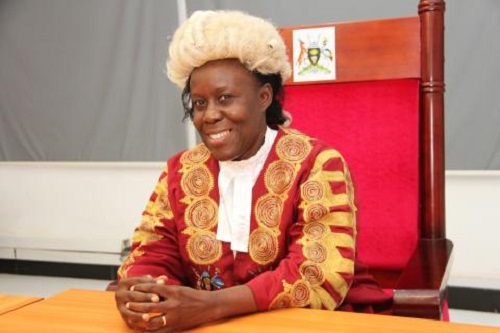
Kampala, Uganda | THE INDEPENDENT | Women lawyers can bring about substantive changes not only in the practice of the law, but in the law itself, Supreme court Lady Justice, Prof. Lillian Tibatemwa-Ekirikubinza has revealed. Speaking to women lawyers at a virtual conference held on Friday evening, Tibatemwa said women lawyers have a duty to protect women when talking about the law in the promotion of gender justice and ending inequality between women and men.
“I know that these inequalities are reproduced in the family, the community and they are also reproduced in the workplace where we find ourselves as lawyers,” she said. Professor Lillian Tibatemwa is famed for pioneering the jurisprudence of equality program in the judiciary.
The program, which has been running since early 2000, saw Ugandan judges trained in gender justice and human rights. She is of the view that women lawyers cannot depend on their male allies to solely push for the rights of women as a marginalized section of society.
Uganda report by International Bar Association titled; “50:50 by 2030: A longitudinal study into gender disparity in law,” found that while women make up 49% of the legal profession, just about 37% of them get enrolled in the Law Council.
According to the report, progress on the goal of overcoming gender disparity within the legal profession in Uganda has occurred on a variety of fronts, both on individual and collective levels. Quoting the Uganda Association of Women Lawyers (FIDA-U), the report said female lawyers continue to face problems such as sexual harassment, pay inequality, chauvinism, social bias, and conditioning.
It said sexual favors as a basis for employment or promotion (‘sextortion’) was also a matter of concern. Justice Esther Kisakye of the Supreme Court in her thesis study attributed the gender imbalance in the legal profession to sex discrimination at the entry points to the profession.
Professor Tibatemwa observed that while a sizeable number of women have graduated with law degrees and enrolled in the Bar, they need to be positioned in places where they can influence decisions. She said the Uganda Law Society had by late September 2022 registered 5,723 lawyers.
Of those, 3,450 were male, while 2,057 were female. That according to Justice Tibatemwa, means that there are 1,209 more men than women who are registered with the Law Society.
From Makerere University Law School, Professor Tibatemwa said that one thousand one hundred forty-four women have graduated with an LLB degree in the last ten years. The law school statistics indicate that thousand three hundred and fifty-five men had graduated with LLB degrees in the last ten years. So there are two hundred and eleven more men who have gone through law school than women.
“We must position women. The feminization of the legal profession will have meaning only if women are positioned in high levels of this practice. Because this is where decisions are made,” she said. Ironically, Tibatemwa is on record for having been one of the few lawyers who declined to be interviewed for the position of High Court judge.
She then argued that having served as a Vice Chancellor in Charge of Academic Affairs at Makerere university and a law professor, she wouldn’t be comfortable serving at the High ourt. But she encourages young female lawyers to use such appointments so that they can position themselves so as to rise up to the hierarchy of the different streams of the profession.
“We must be where decisions are made. Of course we know that the legal profession is wide. And a young generation should be aware that there is a possibility that what they are engaged in today, may not be what they will be engaged in decades ahead” said Prof Lillian Tibatemwa-Ekirikubinza who shared her personal experience having started as a teaching assistant, rising through the ranks to become the first female law professor and later moving to the Bench as Justice of the Supreme Court.
“I think we need to ask a more important question. Will the legal profession be changed? Will the legal profession be influenced by the increased number of women? Because these two can be referred to as the feminization of the legal profession,” observed Tibatemwa. The 2012 Judiciary Gender Policy and Strategy recognized the absence of female lawyers in senior management positions in the judiciary.
*****
URN
 The Independent Uganda: You get the Truth we Pay the Price
The Independent Uganda: You get the Truth we Pay the Price






Thanks for the news updates.